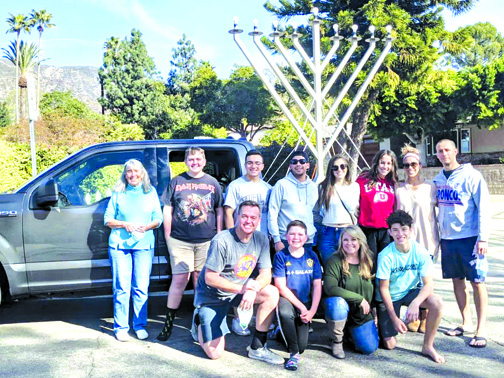
What did the candles say after the menorah complained about it getting too hot?
“Look – a talking menorah!”
Starting a sermon or a Torah essay with a joke is a Jewish custom that dates back to the Talmudic times. The Talmud describes how Rabba – one of the most prominent sages of the Talmud – would always tell a joke, and only afterwards sit in awe and reverence to the holiness of the Torah, and begin his teachings. (See Talmud Tractate Shabbat, 30b.)
But in this case, the question remains: what in fact do the candles of the menorah tell us? What is the story behind the famed eight-branched candelabra that we kindle each year? And – perhaps more importantly – what is its message to us here and now in the year 2021, thousands of years later?
The story takes us back to the year 174 B.C.E. The Land of Israel was ruled by King Antiochus IV Epiphanes of Syria, a man who had a rash nature and was contemptuous of religion. (Polybius, a historian of that time, dubbed him “Epimanes,” meaning “Madman.”)
Antiochus tried to root out the Jews’ individualism by suppressing the Jewish Laws. He desecrated the Holy Temple in Jerusalem, and sent his men throughout the land, forcing its inhabitants to worship pagan gods. Only one refuge area remained in the hills of Judea.
A band of brothers living there, called the Maccabees, assembled a small group of Jews. They rallied, fought and defeated King Antiochus and his army of 40,000 men.
Upon their arrival at the Holy Temple, the Maccabees were met with total ruin. Wishing to immediately rekindle the menorah that would be lit daily, they searched for a jug of oil with the seal of the high priest still intact, a necessity for its lighting. It would take eight days for new oil to be produced.
After much foraging, the Maccabees found one cruse of oil with the seal of the high priest still unbroken! Miraculously, the jug – meant to last for just one day – burned for eight days.
This is the celebration of Chanukah – the victory of the righteous over the wicked, the weak over the strong, the few over the many. It is the eight-day miracle of the oil that we commemorate for eight days by eating oily foods and kindling the menorah.
Upon reflecting on the story of Chanukah, and the miracles therein, I believe the message for us is quite clear: At a time and in a world that we seem so divided, where differences are so pronounced and it seems as if we as a people can’t agree on anything, the message of Chanukah rings clear: every human being is a child of G-d, and was created in his image, with a spark of G-d inside of them, no matter what the person has done, what he or she believes, what their goals and aspirations are, or what they are not. We each have that one pure “jug of oil” with G-d’s seal – a seal that can never be broken – still intact. It is hidden deep within us … within all of us. It is up to us to find it within ourselves and to search for it within others.
While blemishes we can find within ourselves, and differences that we see in others, are real and can possibly need to be resolved or straightened out, nevertheless, the only way we as the human kind can come together is only with the foundation of unity – the one jug of oil that we all find within each other.
From that one little jug of oil, miraculously, we can kindle the flame of love in our community, our nation, our world.
Submitted by Rabbi Mendy Grossbaum
Rabbi Mendy Grossbaumis the rabbi at Chabad of the Crescenta Valley, located in La Cañada Flintridge. Chabad of the Crescenta Valley will be hosting the first ever public menorah lighting in La Cañada Flintridge on Nov. 29 at 4 p.m. at Memorial Park in LCF. Visit cvchabad.org/cvchanukah for more information, or text “Chanukah” to (323) 308-5727.
